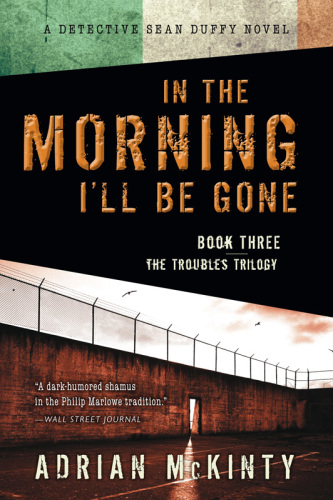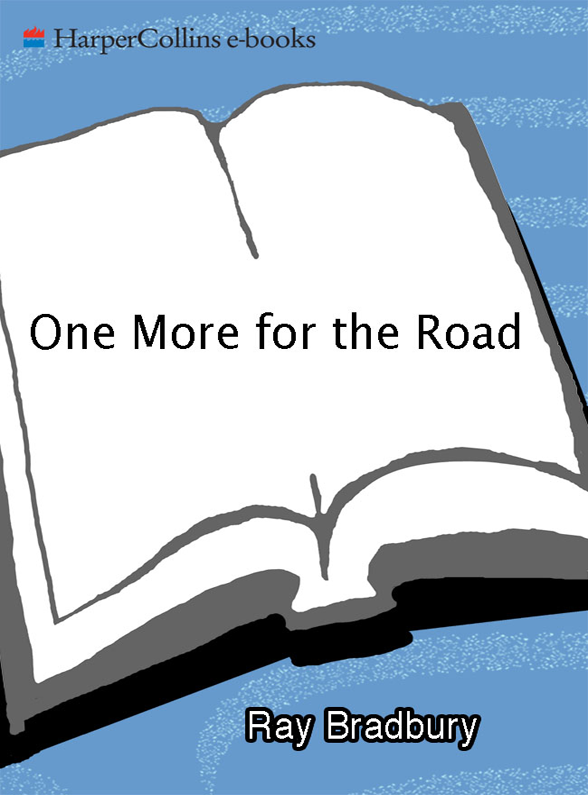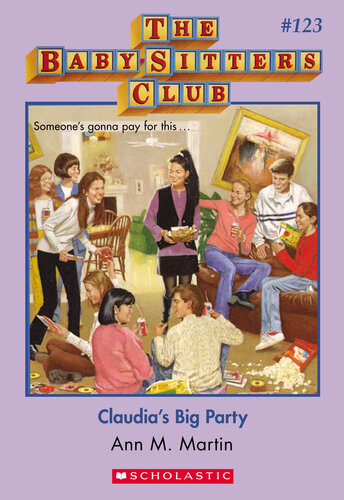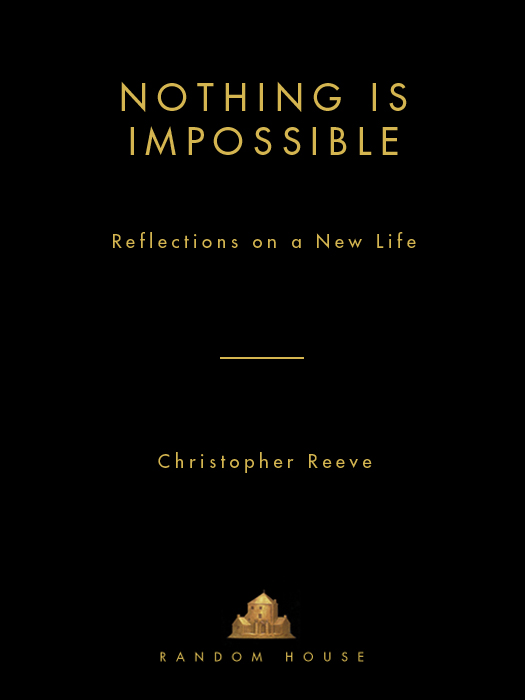oleebook.com
One Day the Soldiers Came: Voices of Children in War de London, Charles
de London, Charles - Género: English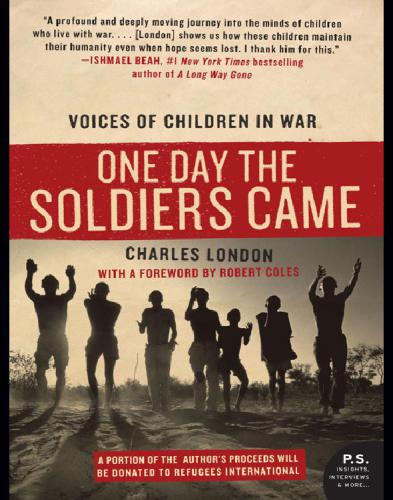
Sinopsis
Today, in violence-torn regions across the globe, 20 million children have been uprooted, orphaned, or injured by war, famine, and poverty. This is their story . . . and ours.
In this powerful and unforgettable bookby turns painful, funny, terrifying, and triumphantCharles London takes us into the world of refugee children, celebrating their unique skills for survival and reflection. Their remarkable stories and drawings chill the blood and touch the heart, offering an indelible, first hand portrait of the war that rages beyond the headlines.
Libros Recomendados - Relacionados
Reseñas Varias sobre este libro
It is a thought-provoking and conversation-provoking read. I kept talking about it to friends and family. It certainly challenges Western conceptions of childhood. Although, as someone from the West (or Global North - pick your euphemism), I'm more comfortable with kids being allowed to be kids and not having to work until they are grown ups. And yes, that is a pipe dream...I know...I know...
Also, there were many accounts of children (especially from Asia and Africa) DESPERATELY wanting to go to school and seeing it as their salvation. They also wanted to grow up and be teachers - since teachers were so respected. Contrast THAT with underpaid teachers in the US and high school dropouts.
My one critique of the book is the author's random use of commas. Sometimes he would stick to the grammatical rules, sometimes, not so much. It really drove me crazy. Just either use the commas or not! Take a comma stand!
nonfiction4 s Ana-Maria Bujor961 64
This is a story book. A book with the stories of children who have survived war. Some are refugees in dangerous camps, some are still tempted by joining the army, some know exactly who is to be hated, others just want to forget. From Kosovo to Thailand, from Sudan to Congo, these stories should be known, together with the fact that children are much more powerful an resourceful than we have grown to believe, as well as moral beings capable of very complex judgment. In some places, we protect them from hearing a curse word or bruising their knee. In other places they work to pay for their education and fear forced army recruitment.
I really the author's manner of presenting the stories an his effort not to be judgmental. Also, there's plenty of information on how to help. One of the best I've read this year.best-books-imho history memoirs ...more3 s Jim Razinha1,362 72
This is a heartbreaking book. I live in a country that doesn't really know war. Nor does it know or seem to care about anything Africa. And will not read or care about what is in this book. Harsh? Please. Watch the news. And then watch again...see anything about Africa? Burma/Myanmar? Anything? Oh, some people know war, obviously, but the country doesn't. And the trend indicates that international awareness is not in fashion.
I try to stay abreast of things in Africa, but that news is apathetic and it's a big continent with a lot of horrific conflict. I have a similar understanding of Burma, Thailand and the trafficking/refugeeism there. But I'll never truly understand. Even if I witness first hand. I know this. I couldn't understand the horrors.
The author spends a lot of time elaborating on the conditions and back stories, so the book is not all the voices of the children. Far from it. And he tempers the horror. That would seems hard, but really, he does. Rape, killing, abuse, starvation, abandonment...dealt in more clinical narratives than reality suggests.
Still...heartbreaking. 2 s Laura71 4
Heartbreaking.by-men non-fiction owned1 Libby1,358 21
The first book I'm reading for the 2010 "Person of Color Reading Challenge." The author is white, so I somewhat feel I'm cheating, but most of the book is based on interviews with children and teens from Rwanda, Sudan, Democratic Republic of Congo, Burma/Myanmar, and the Balkans, so it gives voice to people from around the world.
I read it in ARC format, so I should allow some leniency in any critiques. I felt that it was very, very good, but a little jumpy--some children's stories were followed in some depth and returned to several times, while others were only mentioned once and briefly. This may be due to the reality of how interviewing and being able to keep up with subjects works. I also found it hard to remember who was who when stories were revisited.
Still, it does a powerful job of telling the stories of older children and adolescents who have been through war, and an especially good job of respecting these children--I think the author mentions several times that children are "the protagonists in their own stories," a fact that adults forget. So while these children have been caught in situations that render them powerless, they were still active agents in making their own decisions, figuring out how to survive etc.
Well done.nonfiction1 Miriam700 3
A hard book to read, but worth it. The kids pictures were telling.history kids politics ...more2 s Laura503 1 follower
In my world this is a heartbreaking reseach study. The author has gone to countries to find out how war, displacement and being a child soldier in these wars has affected the teenagers who experienced these situations. He has gone to Africa, Burma, Thailand and Bosnia to talk to youth to learn how they have dealt with their emotions and living situations in regards to their experineces.
Many of the youth in Africa live in refugee camps and have little hope to gain independence and functionality and go to school as so many of them desire. They want to grow and learn and be 'someone'. Many will never have a home and family to return to. Many will be recruited back to being child soldiers despite laws against it.
In Thailand, refugee's have no rights. They don't belong anywhere. They can't go back, nor can they really stay and they don't have the acknowledgement of their new country as people who are able to work. Noone wants them there. How do you survive?
In Bosnia the wars of old continue to tell a story of current times and plays the Albanians against the Serbs. The old war creates the narrative to follow and the difficulties of children to find their place as functioning when there aren't any jobs and people hold so much anger against another ethnic group. The hurt and anger of these youth due to the new war they lived through and old hate, could, according to the author be the spark to help create another war.
I find it all sad and the trauma that they encourage the youth to not think about, the denial of anything being wrong, is just a cesspool of trauma ready to be released at some point of time.
Even though the topic can be heavy the author did a good job of presenting his findings and owning the mistakes he made and the biases he held. It wasn't difficult to read this book and as far as research goes it wasn't your traditional, dry reading. Peter Griekspoor9 1 follower
We are the world, we are the future
Rated this book a four, not for its literary style, not for its great plot, nor for its content or its happy end, in that case I would rate it 2*. But this book and any book on such topic should be read, should make daily headlines. This is one of those books, just books about child poverty or domestic abuse, you just dont want to read but should read, because it is real and should not be forgotten.
Regarding the book: it partly contains self reflections of the author, his own feelings during the many interviews, it tells the story of many ethnical and governmental conflicts that causes the life of children to be torn apart, and it bears whitness of the horrors children in refugee go through, and the atrocities they can commit. Many of those facts fit better in a history book or wikipedia, in fact I found it confusing and distracting. My expectation was to feel those children and in between the naked facts and author self reflections this book did not touch those strings in me.
But the book is also a beautiful story of hope and resiliency of children, the strength of their hearts and spirits. Very inspiring to see how games and drawings allow them to express themselves. This was great and could maybe have been explored much better.
Concluding; what can you expect from such a book that you don't already know or should know? Billions of children live in poverty, hundred of thousands are in refugee, or abused, and this is an ongoing reality with so many organizations trying to help but it seems they are fighting symptoms rather than solving it at its roots: because we are those roots, we are the silent whitnesses, and this book is a kind reminder and therefore I strongly recommend it. Lanier336 18
After interviewing dozens of young people coping with rehabilitation from being forced to be child soldiers, workers in the sex trade or otherwise abused, London analyzes what can be done to help heal these time-tested use of children. Some surprises: boys who actively enlisted and how their "generals" handled them. The disparities between aid for boys versus that for girls.
173Morality Attacks
Xavier and other atrocious acts they cant ever forget.
All the suffering. I have bad dreams about the things Ive done. He was particularly worried that women would see him and punish him for, the bad things Ive done to women.
His societal moral repertoire where murder was wrong, elders should be respected, and those who have been wronged in life exert a force on their violators even after death, were the things that Xavier couldnt let go of, and thank goodness. To lose touch with that strain of humanity would be the final murder of this and other young beings.
He believed in a moral code that did not spontaneously appear in him after he got out of the army, just as Johnny and Luther Htoo believed in the Christian moral code even as they waged guerilla was in Burma and took hostages in Thailand. Xavier, the Htoo boys, Paul, and countless other child soldiers simply did not have access to life choices that reflected the moral sense they had.
London follows with the Catch-22 situation these kids find themselves, kill or be killed. If they hadnt done many of the things they did they surely wouldve been slaughtered by friend or foe.
Mighty Be Our Power by Leymah Gbowee
Protesting the Libyrian War shitty negotiations between Charles Taylor
Sometimes I think you Americans need to take over y9our government
On Daily Show Nov. 14, 2011
Taylor is in the Hague facing War Crimes in Sierra Leone
Women are sponges, taking all the dirt and never having time to TALK.
National Reconciliation similar to South Africa, although its extremely difficult since many people who have been rehabilitated and returning to the communities, those who recognize these killers, must make decisions that are NOT easy.
President Sorleaf
Prayer the Devil Back to Helldocumentary
Producer/director Gini Reticker (A Decade Under the Influence, Class of 2006) turns her attentions to the topic of peaceful protest by exploring
One Day the Soldiers Came, by Charles London
Thurs., Dec. 8. 2011
pg 3¶ 3 to bottomPlaying soccer with kids to truly get to know them
pges 16-19 The Question of Lost Childhood?when there truly hadnt been much of a distinction for centuries, with many countries and cultures seeing young people adults as of age 8. Others felt that if one was still in school, they were considered children, while those working or NOT in school, as adults.
From the Dark Ages till now, how children and childhood has been redefined culturally.
In the 1600s, Information via the Printing Press, separatedyet ONLY for the Middle and Ricjh Classesthis notion of school-induced safety period of attaining knowledge. The poor, the world over have seen childhood or this transition into adult realms far younger as a necessity.
pg23Johnny and Luther Htoo, part of Gods Army on the border of Thailand and Burma, Age of body does not determine age of soul many children, through the strength of the Holy Spirit they have received, have bravely fought for Christ even to the shedding of their blood. this adaptation to St. Thomas Aquinas famous Age quote seems more appropo.
Reconciliation and Re-admittance into Society -
177mid opening section
Even though they did not commit these deeds by choice, they are held responsible for them and often blamed for all the crime and misfortune that befalls the community after their return. On the other hand, the clensing ritual can allow the child to take responsibility for the atrocities she has committed and free her of guilt.
The Acholi people of northern Uganda call their mea culpa disculpame, mato oput. Many former LRA kids have been cleansed through a process where the elders instruct these former killers.
The child crushes an egg to symbolize the leap a new beginning; he leaps over a stick of bamboo to symbolize the leap from the past. He drinks a bitter brew made from the herbs of the oput tree with the people he has wronged, both parties accepting the bitterness of the past and vowing never to taste such bitterness again. ¶1177
Similar rituals occur in Bosnia, Sierra Leone, Mozambique and Angola
As I'm reading more in Stephen Covey's The 3rd Alternative , I'm learning that many African nations have always had these forgiveness through Ubuntu philosophies. In other words, every one is valued within the community. I cannot exist if I don't feel you exist. "I can't truly be human unless I fully see and value your humanity as well," [Covey pg. 271].
215confused since one day her friends would ID her as Muslim since one relative was and the next as Catholic since another was. But it didnt matter,. We were all in the same situation in Sarajevo. Catholic, Jew, Serb, Muslim. We were all in the same kind of hell.
¶1
Her 11th birthday was marred by having one of her best friends head getting blown away by snipers. Survival, not snacks and gifts were her only concern and the lasting memory.
¶3 I saw him bleeding, dead. It was very sad because I had a crush on this boy, he was my best friend. I thought I would have profound thoughts when I was about to die, but all I could think was that it was good that this day was my birthday. My parents would save money on engraving the headstone. They would only need to put one date on it and they would save money on throwing a small party for me that night. Milena51
An important topic for everyone to know more about. Interesting and tragic at the same time. I appreciate that the author spoke to children from different war zones in Europe, Southeast Asia, and Africa, making the book more balanced overall. There were times in the book where the writing (& interviews) seemed awkward and belaboured, but worth the read nonetheless.politics Sue Spark5
A shocking book portraying stories of children in war. Western Australia, we dont know how good life is! Jenny85 36
This book was excellent. I learned so much about the suffering the children in countries such as Sudan, Democratic Republic of Congo, Sierra Leone, Burma and others go through when their countries are at war. This book brings this suffering to light. It is not something, I think, that people dwell on when they talk about war, and this book makes you realize that the children are the ones to suffer the most.
Many are parentless, homeless, or both after a war occurs in their country. Little ones learn to fend for themselves, usually by stealing. Children are forced to join the armed forces, and learn at an early age what it is to kill people.
They long for their homes to be back to normal; where they can live again with their families and play and go to school. Just about all the children the author spoke with expressed that desire...to be able to go back to school and study. They have dreams of being doctors, lawyers, and other honorable professions.
I thoroughly enjoyed this book, altho I did find it depressing at times to the point where I had to put it down and walk away from it for a while.favorites Philip1,503 91
I really wanted to give this book a higher rating, as it brings to light a very important topic -- the exploitation of children in some of the world's longest lastest conflicts. Having lived in Belgium and heard much of the history of the Congo, and then recently reading the book Endangered, I am very interested now in learning even more about these humanitarian tragedies in the Africa, the former Yugoslavia and elsewhere. However, I was expecting this book would be more of an oral history, where the stories were told by the children in their own words. Unfortunately, London only uses occasional short passages from the children which are broken up by long stretches of his own exposition and explanation.
Overall, I think this story would have been better served by letting the main characters speak more for themselves. Some of the most powerful war stories I've ever read are books Bloods (Vietnam) or The Good War (World War II), and even World War Z (the Zombie War -- yes, I know), where the entire book is told through first-person recollections.africa-sub-saharan humans-suck war Betsey Brannen198 7
Although this book was an interesting read, I am still unsure as to London's actual purpose in his writing. Either he is writing a story to write the story and hopefully bring some type of awareness to the atrocities committed in the Sudan, Thailand/Burma, and etc. Or he is writing the story to bring his own feelings and thoughts to the forefront in a prose-style format. I'm going to go with the former, as at the end of the book there is a one page description of Refugee International. Unfortunately, this is not something that London does exceptionally well. As much as I found the stories he writes interesting, they seem to draw on and on (especially Sudan), and at some point the reader does feel they are simply reading the same stories over and over again. At one point I wanted to yell, "I Get it!"
That being said, I do not know if there are other books on the horrible plights of these children, so London's could simply generate awareness from being the "first." Kendall Nielsen29 3
Not terribly well written. He seemed hard to follow at times as he jumped from conflicts in different parts of the world. I expected a more in depth view of the impact of war on children but what he provided were glimpses into the lives of the children he was interviewing at that time without any follow-up. It would be interesting to do a follow-up with the children he outlined in his book 10-15 years down the road however, particularly for those children in refugee camps, it seems that would be nearly impossible to do. Bec1,183 10
A good basic read around some of the worlds most current conflicts (Burma, Bosnia, Congo), with some basic history that the world hasn't changed that much since roman times. I would recommend it as an introduction to how war affects children and their families and some of the history of what these conflicts have been based around.
It has made me want to improve my world histroy further as I'm not sure too many people have a grip on the actual vs what the general media feeds us.2008 historical non-fiction ...more Michele33 1 follower
An eye opening account of what children go through and endure; how they learn to survive, fore go their child hood, escape war torn countries, etc... How they cope, have dreams, and find support amongst other children. It's a gripping story with many children's accounts of war they've experienced. Charles London did an outstanding job capturing the facts, the emotions and reality that these children face on a daily basis. Rachel441
Heartbreaking. There is no other word for it. Despite the reading I've done in the past months trying to better understand the situation of refugees, I cannot begin to imagine what these children have gone through, how they get through each day and make it to the next. Nor can I imagine facing them day after day to interview them for a book this. Charles London is made of stronger stuff than I am.global Emily17 1 follower
I thought this book was pretty good. I how the author added in his own musings concerning the children and the concept of war, even though he could be longwinded at times. Not only did I learn a lot, but I actually thought it was an interesting read! Overall, the book isn't too morbid, but it does get you thinking. I'd recommend this to anyone interested in learning more about issues concerning children of war in various parts of the world. Kathleen McRae1,532 8
Charles London interviewed children from many war stricken places and through drawings that these traumatized children did plus their stories in their own recollections and words he wrote this book.It was a hard book to read but it surely showed the human spirit to survive and try to find a place where they can fit in and try to continue on with their lives. Stefanie Robinson1,919 8
This book is tragic. Children convey their experiences in a poignant way. I appreciate their experiences, and I cannot imagine having to live through the horrors of war on your own soil. I really didn't the book all that much, though I cannot think of a real reason why. I hope that other people read and enjoy it. african-history asian-history european-history ...more Natalie282 44
Look! Sandy's book! on the internet!!non-fiction Will29
Some good reflections by the author, but too limited to his personal experiences... didn't learn much Hannah164
Autor del comentario:
=================================

